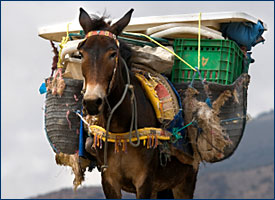Conserving Animal Rights
The Attenuation of the Biological World — Part 3
The Importance of Conserving Animal Rights
It is not, and while the more than 500 international environmental treaties are a good start, they do not begin to ensure the level of protection necessary for diverse ecosystems upon which we are all dependent; nor do they protect the individual lives of species, rare or otherwise. Only recently, for example, did the Thai Government agree to outlaw the use of working elephants on the streets of Bangkok, a throwback to that period in 18th century French history when cat killing was a public amusement; or the scorn targeted at Lord Erskine who dared to challenge his colleagues in the British Parliament in the early 1800s to step outside their privileged abodes and consider the legality and ethical bankruptcy of a system that allowed for torment to be inflicted upon every other horse and burro across Great Britain in the name of utility.
 The term “animal rights” continues to elicit strong emotional reactions from those who oppose the notion that animals should have any legal standing whatsoever; that a tree is worth more alive than dead. The Swiss public that, until just recently had thought of itself as rather enlightened when it came to animal rights, recently threw out a remarkable referendum that would have provided every animal in need with a lawyer to speak on its behalf, the cost of such legal work to be born by the Swiss taxpayers.
The term “animal rights” continues to elicit strong emotional reactions from those who oppose the notion that animals should have any legal standing whatsoever; that a tree is worth more alive than dead. The Swiss public that, until just recently had thought of itself as rather enlightened when it came to animal rights, recently threw out a remarkable referendum that would have provided every animal in need with a lawyer to speak on its behalf, the cost of such legal work to be born by the Swiss taxpayers.
With projections suggesting that our species could well exceed ten billion individuals by the end of this century, the majority of them living near to or beneath the commonly-accepted benchmarks characterizing the poverty line, cramped in densely-stuffed megacities across the planet, receiving waves of yet more daily immigrants from the denuded hinterlands in search of greener pasture (how ironic but this is precisely the scenario that has played out in the aftermath of the seismic disaster to befall Port-au-Prince) there is no question that we are living in a make-or-break generation, a concept no longer obtuse or unprecedented, but one that points precisely to the same crisis of conscience described by thinkers from the time of Thales, Aristotle, Lao Tzu, Mahavira and Marcus Aurelius, to St. Thomas Aquinas, Hugo Grotius, Erasmus, Rousseau, Thoreau and Lewis Mumford. More recently, the question of our species’ success or failure and the history of its pitfalls has been exhaustively analyzed by Oswald Spengler (Decline of the West, 1918), Clarence Glacken (Traces on the Rhodian Shore: Nature and Culture in Western Thought from Ancient Times to the End of the Century, 1976) and Arnold Toynbee (Mankind and Mother Earth: A Narrative History of the Earth, 1976) and in the many works by Paul and Anne Ehrlich.
Part 2: Biodiversity in Crisis: Loss of Sustainability
Part 4: Global Conservation vs. Individual Thinking
Comments Off
